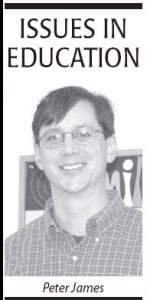Laugh in their face, or bite my tongue and walk away? Those are the two options that jump to mind when someone remarks how great it must be to work in education and have my summers off. Thankfully, I rarely follow through with either of those, often managing a brief explanation of how it is more “different” than “off” and a quick shift to other topics of conversation.
Still, it seems to me that there is a persistent and fundamental misunderstanding about the nature of our education system and the many important aspects of it that take place away from students in the classroom. In addition to the board, committee, and working group meetings that occur year-round, a district might need to undertake facility improvements, curricular updates, systems implementations, staffing or assignment changes, and/or technology upgrades. All of these are best handled when the impact to teachers and students is minimal.
Even if there are no new projects, the list of mandatory requirements – including year-end reporting, a financial audit, and countless service contract renewals – is enough to keep most administrators busy. At the same time, teachers are often developing new or additional resources to enhance their teaching, taking courses to help them meet the continuing education requirements necessary to maintain their licenses, or preparing to serve a whole different group of students in the fall.
Throughout it all, the facility needs to be maintained, the payroll must be prepared, the bills have to be paid, and … hey, wait a minute! There is one part of our education system that seems to be taking the summer off: the state government! The Minnesota Department of Education (MDE) has notified schools that, in the event of a government shutdown, schools won’t be getting paid.
This is not the usual kind of “not getting paid” where schools receive just 70% of what they are promised during the year and the balance months into the next year. That’s called a “holdback”, and it’s the way schools receive their funding on a regular basis. Over the past few years, the “holdback” has grown from 10% to the current 30% of our revenue. It is a technique that allows the state to pay its bills late without having to borrow the money. Of course, schools are required to pay their bills on time, so schools (especially new or smaller schools) end up borrowing money to cover their expenses, and often end up paying more in interest payments than on classroom supplies, or curriculum, or maintenance.
This is also not the kind of “not getting paid” where the state decides that schools who have managed to build a reasonable fund balance can absorb an additional “deferral” of their payments whenever the state checking account doesn’t look so good (as has happened in each of the past two years). Nor is it the kind of “not getting paid” that has seen each year’s per pupil funding slip further behind the growth in expenses as inflation shifts more of a school’s budget to non-educational items such as utility bills, transportation, and facility costs.
No, the “not getting paid” MDE is warning about this time is not getting paid at all: zero dollars showing up on the 15th and 30th of each month until a budget is approved. The governor has determined that, while education is “essential,” it is not “critical,” and therefore not something that needs to be funded in the event of a shutdown. At this point, the attorney general’s view is somewhat different, and ultimately a court will decide whose perspective will guide emergency funding. And, of course, there’s always the chance that a budget compromise will be worked out by the end of the month and all this fuss will be for nothing.
Except that it’s not for nothing. It’s a fuss because the chain of impact that runs from schools through kids to voting parents has become the political weapon of interests on both sides of the aisle. Each is weighing the potential outcomes of their strategies, marketing the blame toward the other, and polling to find out who the voters will hold accountable for any downside. It is a fuss that is contrived to serve the interests of politicians, not students; and it is a fuss that exploits the dysfunctional system of educational funding rather than fixing it.
Perhaps everyone will be relieved to go back to the same old ways of “not being paid.” Perhaps folks will be satisfied and not push for real improvements in public school funding. I’m not sure, but I hope not. In addition to tackling the usual educational items mentioned earlier, schools are spending the summer figuring out how they will be able to pay their employees, landlords, service providers, and everyone else who must in turn pay their bills. Is it too much to ask that our elected officials spend some time working out a better way to support us before taking their summer off?
Each month a representative of our local schools will offer thoughts in Issues in Education. This month’s s contributor is Peter James, director of Great Expectations School.



Loading Comments